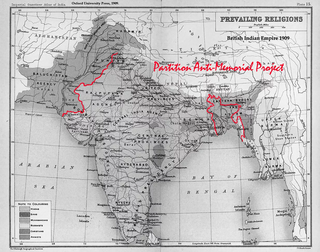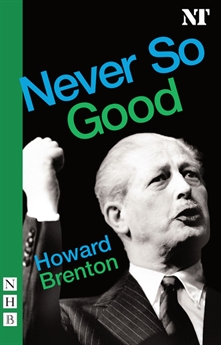
Daniel Jacob Radcliffe is an English actor. He rose to fame at age 12 when he began portraying Harry Potter in the Harry Potter film series. Radcliffe plays Potter in all eight films in the series, beginning with Harry Potter and the Philosopher's Stone (2001) and concluding with Harry Potter and the Deathly Hallows – Part 2 (2011).

Private Lives is a 1930 comedy of manners in three acts by Noël Coward. It concerns a divorced couple who, while honeymooning with their new spouses, discover that they are staying in adjacent rooms at the same hotel. Despite a perpetually stormy relationship, they realise that they still have feelings for each other. Its second act love scene was nearly censored in Britain as too risqué. Coward wrote one of his most popular songs, "Someday I'll Find You", for the play.

Cyril John Radcliffe, 1st Viscount Radcliffe, was a British lawyer and Law Lord best known for his role in the Partition of India. He served as the first chancellor of the University of Warwick from its foundation in 1965 to 1977.

The Radcliffe Line was the boundary demarcated by the two boundary commissions for the provinces of Punjab and Bengal during the Partition of India. It is named after Cyril Radcliffe, who, as the joint chairman of the two boundary commissions, had the ultimate responsibility to equitably divide 175,000 square miles (450,000 km2) of territory with 88 million people.
Howard John Brenton FRSL is an English playwright and screenwriter, often ranked alongside contemporaries such as Edward Bond, Caryl Churchill, and David Hare.

Jermyn Street Theatre is a performance venue situated on Jermyn Street, in London's West End. It is an Off West End studio theatre.

The Partition of India and the associated bloody riots inspired many creative minds in the republics of India, Pakistan, and Bangladesh to create literary/cinematic depictions of this event. While some creations depicted the massacres during the refugee migration, others concentrated on the aftermath of the partition in terms of difficulties faced by the refugees in both side of the border. Even now, more than 60 years after the partition, works of fiction and films are made that relate to the events of partition. W.H. Auden in his poem "Partition" showed the dilemmas of Cyril John Radcliffe, 1st Viscount Radcliffe, responsible for deciding which parts of India went where.
Stephen Howard Davies, was a British theatre and television director.

James Edward Carter is an English actor. He is best known for his role as Mr Carson in the ITV historical drama series Downton Abbey (2010–2015), which earned him four nominations for the Primetime Emmy Award for Outstanding Supporting Actor in a Drama Series (2012–2015). He reprised the role in the feature films Downton Abbey (2019) and Downton Abbey: A New Era (2022).

Miranda Caroline Raison is a British and French actress. She is best known for playing Jo Portman in five seasons of Spooks (MI5) and Nellie Davenport in HBO's Warrior. She originated the title role in Howard Brenton's Anne Boleyn at Shakespeare's Globe Theatre and played Hermione in Kenneth Branagh's production of The Winter's Tale, both to critical acclaim. She is also a prolific voice artist.
Alan MacKenzie Howard was an English actor. He was a member of the Royal Shakespeare Company from 1966 to 1983 and played leading roles at the Royal National Theatre between 1992 and 2000.

Aren't We All? is a comic play by Frederick Lonsdale. The plot of this drawing room comedy concerns the Hon. William Tatham, whose wife catches him kissing another woman at a party, and he is determined to catch her in an extramarital kiss of her own; meanwhile a society grande dame has designs on an aristocrat, who is prone to afternoon flirtations with shopgirls at the British Museum.

Never So Good is a 2008 play by Howard Brenton, which portrays the life and career of Harold Macmillan, a 20th-century Conservative British politician who served as Prime Minister (1957–1963). It was first performed in the Lyttelton auditorium of the National Theatre, London, on 26 March 2008; previews began on 17 March 2008.
Magnificence is a 1973 play by English playwright Howard Brenton. It premiered at the Royal Court Theatre and was next performed on the London stage in 2016, at the Finborough Theatre.
Bloody Poetry is a 1984 play by Howard Brenton centring on the lives of Percy Shelley and his circle.
Lucy Bailey is a British theatre director, known for productions such as Baby Doll at Britain's National Theatre and a notorious Titus Andronicus, described by a critic as "all eye-catchingly visceral but there’s little depth". Bailey founded the Gogmagogs theatre-music group (1995–2006) and was Artistic Director and joint founder of the Print Room theatre in West London (2010-2012). She has worked extensively with Bunny Christie and other leading stage designers, including her husband William Dudley.
55 Days is an English history play by Howard Brenton, centred on the 1649 trial and execution of Charles I of England following the English Civil War. It premiered at the Hampstead Theatre from 18 October to 24 November 2012, in a production directed by Howard Davies and featuring Mark Gatiss as Charles, Douglas Henshall as Oliver Cromwell, Gerald Kyd as John Lilburne and Simon Kunz as Lord Fairfax.

Lawrence After Arabia is a 2016 play by the British playwright Howard Brenton, centred on T. E. Lawrence and his 1922 retreat from public life at the home of his friends George Bernard Shaw and his wife Charlotte. Its premiere production ran from 28 April to 4 June 2016 at the Hampstead Theatre in London to mark the centenary of the outbreak of the Arab Revolt, in which Lawrence played a leading part.

Nikesh Patel is an English actor. He is known for his roles in the Channel 4 drama Indian Summers (2015–2016), the Hulu miniseries Four Weddings and a Funeral (2019), the BBC sitcom Starstruck (2021–present), and the Amazon Prime thriller The Devil's Hour (2022–present).
The Jungle is a play by Joe Robertson and Joe Murphy.












